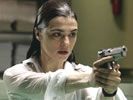Intellectually cheeky and visually audacious, Constantine is based on the DC comic Hellblazer but only comic book geeks - excuse me, graphic novel enthusiasts - will care about the liberties taken with the source material. The rest of us are free to bask in Keanu's fabulousness and the movie's jaw-dropping images which, unlike most CGI-heavy productions, possess real aesthetic weight: when a young girl teeters on the roof of a skyscraper, you can feel the vertiginous tug of the void below her.
 Cool to the bone, Reeves inhabits John Constantine, a chain smoking paranormal gumshoe who dresses unvaryingly in the colours of his moral universe (black and white) and lives in a grungy apartment, decorated with overflowing ashtrays and gallons of holy water. Men's souls, we are told, are caught in the eternal tug-of-war between God and Satan, neither of whom are permitted to manifest on earth. They can, however, influence us by means of "half-breeds" - demon/human hybrids who speak in British accents, dress like spokesmodels for The Men's Wearhouse and look eerily like Gavin Rossdale, erstwhile frontman of the rock band, Bush.
Cool to the bone, Reeves inhabits John Constantine, a chain smoking paranormal gumshoe who dresses unvaryingly in the colours of his moral universe (black and white) and lives in a grungy apartment, decorated with overflowing ashtrays and gallons of holy water. Men's souls, we are told, are caught in the eternal tug-of-war between God and Satan, neither of whom are permitted to manifest on earth. They can, however, influence us by means of "half-breeds" - demon/human hybrids who speak in British accents, dress like spokesmodels for The Men's Wearhouse and look eerily like Gavin Rossdale, erstwhile frontman of the rock band, Bush.Constantine's thoroughly original hook is that our hero's ability to see these creatures caused him to attempt suicide as a teenager. Condemned to hell when he dies, he now spends his days patrolling LA on the hunt for demons to exorcize in a desperate bid to buy his way back into heaven. ("This is Constantine, John Constantine, asshole," he tells his prey, with Neo-Bondian style.) Things get exponentially stickier when the Spear of Destiny - used to pierce Christ on the cross and until now in the possession of Mel Gibson - turns up in the hands of a Mexican farmer and the Antichrist begins its journey down the birth canal of an unsuspecting major character.
Joining forces with a gorgeous detective (Rachel Weisz), investigating her twin's suicide, Constantine questions his "contacts" for clues to Satan's immediate plans. The angel Gabriel (a wonderfully androgynous Tilda Swinton), wearing what appears to be Tony Kushner drag - distressed straitjacket and six foot wings - merely mocks his efforts, while a shady character named Midnite (Djimon Hounsou), who manages an after-hours club for the after-dead, advises him to give The Dark One some space. Undeterred, Constantine plants himself on the electric chair from Sing-Sing, sticks his feet in a bucket of water, and takes a trip to Dante-town.
Constantine is best enjoyed by ignoring the Milton-centric mythology and surrendering to the movie's lush atmosphere and wicked performances. Director Francis Lawrence, fresh from music videos, naturally, and acclaimed cinematographer Philippe Rousselot have created a post-apocalyptic LA, where rats and crabs infest the gutters and demons dissolve into clouds of scurrying roaches. Rousselot keeps the center of the screen deep and dark while framing everything - cowering bums on damp sidewalks, a body crashing through a skylight - in fizzing streetlights and sickly-yellow fluorescents. The light in this film is as absolute as its morals.
Messy and illogical, Constantine works mainly because of Reeves. Like a magnet, he draws all the disparate elements beneath his flapping black coat and holds them up for our attention. And if you have trouble accepting a tortured antihero driven not by philanthropy but by his own mortality, just watch Keanu. He'll make you believe.

Great review man,keep up the good work.
RispondiEliminaWatched Constantine back then, 'twas nice.